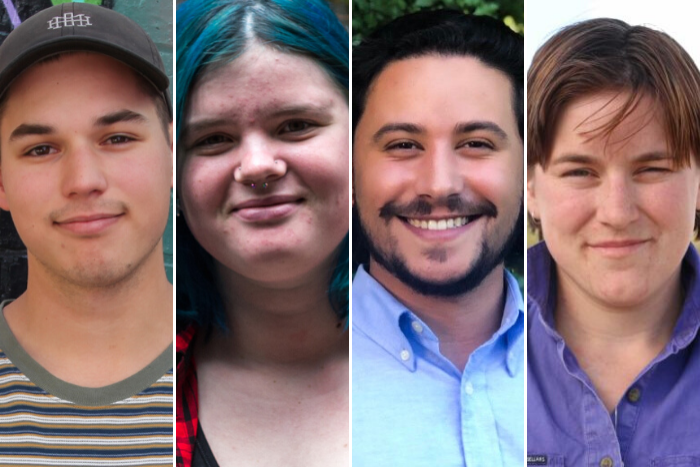“I think a lot of it is this sense of uncertainty about the future … a sense that we aren’t in full control of our lives.”
Young Australians are in many ways at the coalface of the country’s mental health crisis.
Rates of mental health concerns appear to be getting worse and teenagers are increasingly ending up in the emergency department in mental health crises.
Three quarters of people who have mental illness develop symptoms before the age of 25, and in 2018, suicide accounted for more than a third of deaths among 15-24 year-olds.
The results, then, of the Australia Talks National Survey should come as little surprise.
Of the 54,000 Australians surveyed by the ABC, 44 per cent of 18-24 year-olds rated their mental health as average or poor.
More than a third reported struggling with anxiety, 30 per cent said they frequently or always feel lonely, and one in five reported feeling frequently or always sad.
Are we raising a generation of unhappy, non-resilient adolescents? Or have smartphones destroyed Gen Z?
Perhaps, parents are to blame for ruining childhood. Or maybe it’s that looming environmental crisis?
The causes of mental health problems are complex and varied — linked inextricably to our social, economic and physical circumstances.
While some experts say it’s not clear what’s driving high rates of stress, almost all agree there are gaps in mental health services and support.
We asked five young Australians about what they think is shaping the mental health of young people today.
‘Young people don’t feel like their opinions matter’
Kareem El-Ansary has spent a good part of the last 12 months on an nationwide “listening tour” as the 2019 Australian Youth Representative to the UN.
“We did 233 consultations across the nation; about 60 towns and cities, we went to every state and territory, with a healthy mix of urban, regional and remote communities,” he says.
“Almost everywhere I went in consultations, mental health came up. It’s impacting young people across the board.”
Kareem says stigma around mental illness, limited access to services, and a lack of tailored youth programs are some of the major challenges young people identified.
When asked what was driving concern and worry amongst young people, Kareem said climate change dominated a lot of conversations.
“It wasn’t just in inner-city Melbourne or Sydney, it was out in regional, drought-affected communities, and in rural and remote communities,” he says.
Kareem says many young Australians also voiced concerns about the education system and their future job prospects.
“Your average 15-year-old in Australia will now have 18 different jobs and five different careers in their lifetime,” he says.
“Young people expressed that they weren’t perhaps learning skills that would allow them to make those transitions easily.”
Kareem also found most young people didn’t “feel like their opinions matter or are taken seriously” by politicians or decision makers.
“What was really clear is that young people don’t feel like they are part of the important conversations that are shaping their lives today and will impact their future.”
‘Eating disorders are super prevalent’
Varsha Yajman has just graduated high school on the New South Wales central coast. She says while most of the conversation about mental health focuses on depression and anxiety, there are other issues needing attention.
“Eating disorders are super prevalent, and I think they’re just not talked about enough,” Varsha says.
Going through high school, Varsha says many of her friends struggled with body image and being surrounded by diet culture on social media.
“Things like Instagram and Facebook … [they’re] insisting that we have this perfect body, and then every single year there’s a new body type,” she says.
Varsha is part of the National Leadership Team for the Australian Youth Climate Coalition, and says environmental concerns are something she and her peers feel acutely.
She says that for many young people, watching the news and absorbing what is going on around the world can sometimes feel overwhelming.
“Every day on your Instagram there’s a new issue coming up or there’s a new protest somewhere,” she says.
“We have so many proxy wars being started … and what’s happening in Hong Kong — it’s just shocking to see.
“I feel like for the people who aren’t politically aware, it doesn’t seem like much at all. But then to those who are, it just feels like too much.”
The proliferation of confronting content online
Dan Reid grew up in suburban Sydney and first experienced mental health problems in Year 11.
“I basically just started having panic attacks … and it kind of developed into more of a depression,” he says.
At the time, Dan had access to a counsellor. But during his first year out of high school, things started to get pretty bad.
“There was lots going on around me. We got evicted from my house and my mum got made redundant, which was pretty hectic,” Dan says.
Dan now works full-time as a youth worker at The Reach Foundation in Melbourne. He says the proliferation of digital media and confronting online content seemed to be having an impact on the teenagers he works with.
“Things to do with death, terrorism around the world, and just hateful stuff … that is everywhere all the time,” he said.
Social media has also changed the dynamic of peer groups, Dan says, and has made young people vulnerable in a way they haven’t been before.
“Bullying used to generally just happen at school, and at least home was a safe space,” he says.
“Whereas now, you’re on your phone all the time … it’s a really isolating feeling to be sitting at home and copping it.”
Barriers to getting help in regional Australia
After her own personal experience with mental illness, Sally Downie became a mental health advocate for young people in regional and rural Australia.
The daughter of dairy farmers, it was the impact of drought and the uncertain future of her family’s farm that led Sally to experience significant amounts of stress as a teenager.
“I saw the stress and impact it had on my family, particularly my parents, and I was worrying about them,” she says.
“But I had to go to school and put on a face and pretend that everything was fine — because they didn’t want us to talk about how the farm was struggling.”
External link: https://www.abc.net.au/news/health/2019-11-21/whats-driving-mental-health-concerns-young-australians/11714120
















